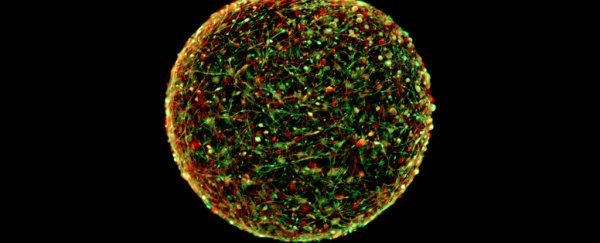Working miniature brains with functioning nervous tissue could easily and inexpensively be used for testing in biomedical research, possibly lessening reliance on animals, researchers say.
According to the team behind the 'mini-brains' – which are functional in that they are an electrically active sphere of central nervous system tissue – the mini-brains could be ideal for testing things like drugs research, neural tissue transplants, or experiments with stem cells. The process for building them is described in a new paper by researchers from Brown University in the US.
"We think of this as a way to have a better in vitro [lab] model that can maybe reduce animal use," said co-lead author Molly Boutin. "A lot of the work that's done right now is in two-dimensional culture, but this is an alternative that is much more relevant to the in vivo [living] scenario."
Mini-brains, which do not have the capacity to think like a full-sized brain, can be made from existing living tissue. According to the researchers, even a small sample of living tissue taken from a rodent is enough to make thousands of mini-brains through a process of isolating and concentrating the cells in a centrifuge and seeding a cell culture.
The brain tissue sphere starts to form just one day after the cultures are seeded, with the neural network of the full mini-brain taking two or three weeks to develop. The technique is described in Tissue Engineering Part C: Methods.
The resulting brains, which only measure one-third of a millimetre in diameter, would cost approximately 25 US cents to make, meaning they could offer a cheap and practical 3D test-bed for laboratory purposes.
"The materials are easy to get and the mini-brains are simple to make," said co-lead author Yu-Ting Dingle. "We could allow all kinds of labs to do this research."
"We knew it was a relatively high-throughput system, but even we were surprised at the low cost per mini-brain when we computed it," added senior author Diane Hoffman-Kim.
The researchers developed the mini-brains for use in their own research testing, where they're looking at areas such as neural cell transplantation and studying how adult neural stem cells develop.
But they could be purchased for use by researchers in a wide range of biomedical areas, opening up neural test-bed opportunities for those who aren't fully up on their neuroscience – or who do not possess the cell culture equipment needed to whip up mini-brains.
"If you are that person in that lab, we think you shouldn't have to equip yourself with a microelectronics facility," said Hoffman-Kim, "and you shouldn't have to do embryonic dissections in order to generate an in vitro model of the brain."
